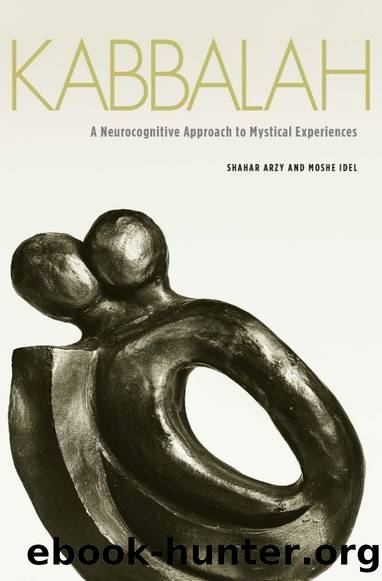Kabbalah: A Neurocognitive Approach to Mystical Experiences by Shahar Arzy

Author:Shahar Arzy [Arzy, Shahar]
Language: eng
Format: epub
ISBN: 9780300152364
Google: l0bCCQAAQBAJ
Amazon: 0300152361
Barnesnoble: 0300152361
Goodreads: 23360130
Publisher: Yale University Press
Published: 0101-01-01T00:00:00+00:00
Conclusions
1. Some Final Methodological Remarks
The present study is part of an effort to widen the methodological tools that should be used in understanding the complexities characterizing the experiences reflected in Kabbalistic and other mystical literature. Such an effort is sometimes the result of conversations between scholars from different fields, conversations which may open some aspects of Kabbalistic literature to fresh understandings that produce new perspectivesâif done in a cautious manner. The need to address this literature from many perspectives is an imperative that has been stressed several times in recent studies.1 In addition to the classical methodsâthe philological and the historicalânew methods should be welcomed. Modern approaches of study in the humanitiesâsuch as Freudian, Jungian, feminist, and culturalâmay have social agendas based upon twentieth-century sensibilities, thus offering fewer insights into complexities characteristic of medieval situations. Structuralist or anthropological approaches, though, may contribute to new and more nuanced understandings of earlier texts and traditions. To be sure, if Kabbalists from different circles mingled and spread their knowledge in a significant manner, sociological tools are necessary.2
In order to broaden perspectives, it is insufficient to refer to other methods in sporadic and fragmentary ways; rather, by means of cooperation and dialogue, one should offer a more sustained and systematic treatment, as in the present book. The phenomenology of the different types of mystical experiences found in medieval and premodern literature can be understood in a more profound manner by referring to the results of experimental studies performed independently in the field of neurocognitive science. The more recent developments in this field, in theory, clinics, and brain-imaging technology, have been applied in this book in order to interpret Kabbalistic texts. This application corroborated the phenomenological categories extracted independently from the Kabbalistic literature. Moreover, the findings of neurocognitive mechanisms underlying specific mystical experiences may allow us to consider the possibility that central themes in the study of the human mind that draw the attention of modern philosophers and neuroscientists have already been reflected by the experiences of the prominent figures of Jewish mysticism under scrutiny in this book. A subdivision of natural studies, this approach is also relatively free of sociological and cultural influences, aiming to address cognitive brain-based mechanisms, which are relatively similar across societies and cultures. Finally, such an approach might have an explanatory value for other forms of visionary and mystical experiences present in texts from other mystical literature.
Nevertheless, no single methodology can facilitate a comprehensive understanding of the diversity of the vast Kabbalistic literature, for it cannot reflect the diversity of any massive body of human creativity produced over a long period in diverse religious and social circumstances. Instead, we should better opt for an eclectic approach, better known as âthe toolbox,â or for what may be called perspectivism, which allows changing the methodological perspective in accordance with the specificity of the topics addressed by parts of the literature under scrutiny. Any attempt to impose a single methodological approach is prone to become an ideology that reduces the richness of the thought and practice of the Jewish mystics to simple âtruths.
Download
This site does not store any files on its server. We only index and link to content provided by other sites. Please contact the content providers to delete copyright contents if any and email us, we'll remove relevant links or contents immediately.
| Haggadah | Hasidism |
| History | Holidays |
| Jewish Life | Kabbalah & Mysticism |
| Law | Movements |
| Prayerbooks | Sacred Writings |
| Sermons | Theology |
| Women & Judaism |
The Power of Habit by Charles Duhigg(3139)
Man's Search for Meaning by Viktor E. Frankl(2673)
Mckeown, Greg - Essentialism: The Disciplined Pursuit of Less by Mckeown Greg(2443)
MOSES THE EGYPTIAN by Jan Assmann(2417)
Devil, The by Almond Philip C(2331)
The Complete Dead Sea Scrolls in English (7th Edition) (Penguin Classics) by Geza Vermes(2283)
Unbound by Arlene Stein(2277)
I Capture the Castle by Dodie Smith(2038)
Schindler's Ark by Thomas Keneally(1889)
The Invisible Wall by Harry Bernstein(1808)
The Gnostic Gospel of St. Thomas by Tau Malachi(1799)
The Bible Doesn't Say That by Dr. Joel M. Hoffman(1680)
The Secret Doctrine of the Kabbalah by Leonora Leet(1612)
Political Theology by Carl Schmitt(1586)
The Jewish State by Theodor Herzl(1536)
A History of the Jews by Max I. Dimont(1533)
The Dead Sea Scrolls Bible by Martin G. Abegg(1519)
The Book of Separation by Tova Mirvis(1490)
Oy!: The Ultimate Book of Jewish Jokes by David Minkoff(1374)
